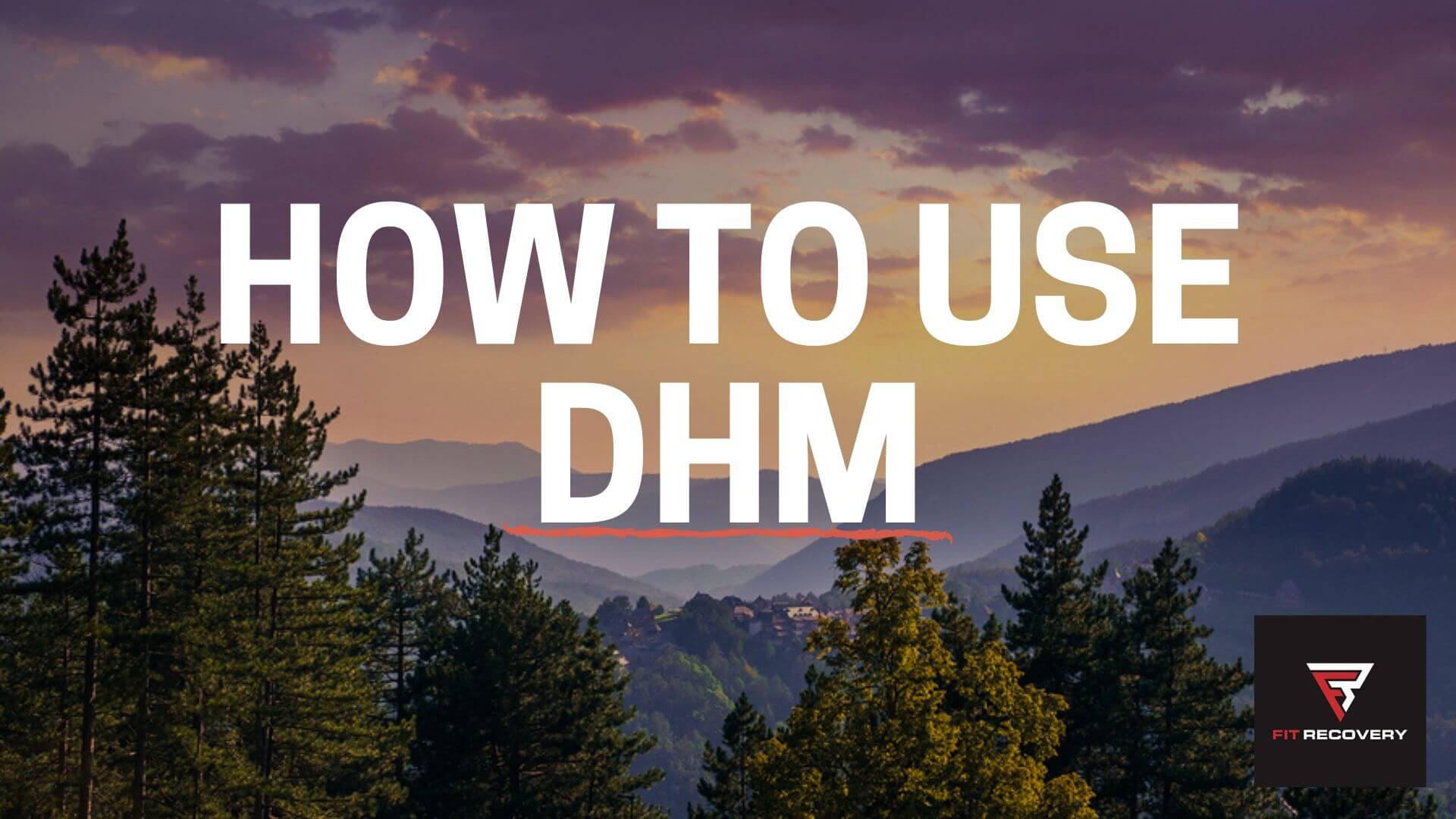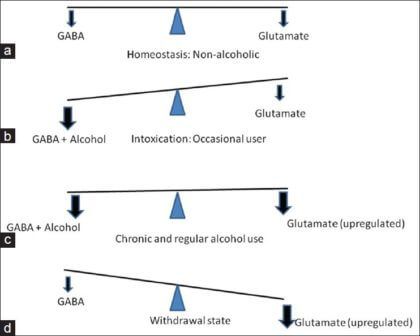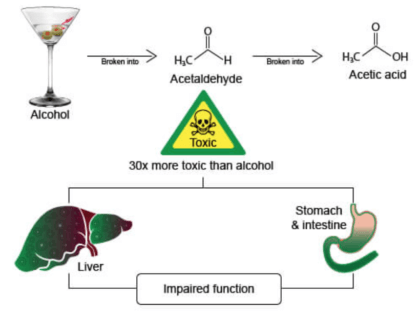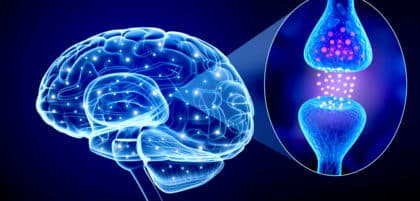The use of dihydromyricetin for alcohol withdrawal is rarely discussed because this natural compound is most often promoted as a “hangover prevention” supplement.

As we will discuss, DHM can be extremely useful for people who are interested in quitting drinking, detoxifying their systems, and restoring balance to their brain chemistry.
After reading this article, you will have a clear understanding of the benefits of using DHM for withdrawal (including post-acute withdrawal). You will also know where to obtain high-quality DHM supplements and what dosage is considered safe and effective.
Overview of DHM

DHM (dihydromyricetin) is a flavonoid found in the fruit of the oriental raisin tree (Hovenia Dulcis). The fruit of this tree has been used for many centuries throughout Asia as a remedy for hangovers.
Research suggests that this herb alleviates hangovers by reducing inflammation throughout the body and directly neutralizing alcohol’s toxic byproducts, including acetaldehyde. Recent studies have also found that DHM can effectively treat symptoms of withdrawal, largely by blocking its effects on GABA receptors.
DHM supplements have become very popular for preventing hangovers. Many people claim that DHM significantly reduces nausea, severe headaches, and light/sound sensitivity the day after drinking.
As a dietary supplement, DHM is also used to relieve the following issues:
- Liver inflammation
- Headaches and migraines
- Blood sugar swings
- Free radical damage
In short, DHM may be as useful for people struggling with withdrawal as it is for people who merely wish to decrease the toxicity of their occasional intake. We will now proceed to explore the mechanisms of action behind DHM.
How DHM Works For Alcohol Withdrawal

Along with kudzu root, Hovenia Dulcis is one of the few herbs that can actually reduce intoxication and withdrawal.
DHM exerts these effects through two mechanisms:
- Enhancing alcohol metabolic enzymes
- Plugging into GABA-A receptors
DHM boosts the efficacy of two enzymes that break down alcohol: alcohol dehydrogenase and acetaldehyde dehydrogenase. The latter enzyme is responsible for breaking down acetaldehyde, which is formed when the liver breaks it down.
Acetaldehyde is estimated to be 30 times more toxic than alcohol itself! It accounts for the majority of hangover symptoms as well as systemic inflammation that results from chronic exposure.

DHM also partially blocks alcohol from stimulating GABA receptors. This is significant because people who drink to relax are essentially drinking to stimulate their GABA receptors.
Specifically, DHM interacts with GABA-A receptors, which are targeted by both alcohol and benzodiazepines. Scientists speculate that DHM may be especially helpful for people who are resistant to the calming effects of benzodiazepines. (source)
Infrequent drinkers who take DHM often notice a reduction in drunkenness and hangovers. Supplementation with DHM has been shown to discourage people from drinking excessively. (source)
For heavy drinkers and people struggling with withdrawal, DHM can help to detoxify the body, rebalance brain chemistry, and mitigate cravings that stem from GABA deficiency.
Because their brains have adapted to the continued presence of alcohol by turning the dial down on natural GABA production, alcohol-dependent people are chronically deficient in GABA. When taken regularly, DHM improves the plasticity of GABA receptors – i.e., the brain’s ability to return GABA levels to baseline.

Now you understand why DHM is uniquely suitable for alleviating withdrawal symptoms. In the proper dosage (more on this below), it is gentle enough to be consumed daily for extended periods of time.
However, DHM is not potent enough to mitigate severe cases of withdrawal. If you are experiencing symptoms like hallucinations or seizures, your best bet is to get professional care immediately. Doctors will likely prescribe a powerful benzodiazepine such as Ativan.
After detox, natural supplementation can be very helpful in preventing post-acute withdrawal symptoms.
Research on DHM

A growing body of scientific research supports the use of DHM for withdrawal:
- In addition to enhancing alcohol clearance and metabolic enzymes, DHM has a direct and complex interaction with GABA-A receptors that likely accounts for many of its anti-alcohol effects. (source)
- DHM counteracts acute alcohol intoxication and helps to reduce alcohol withdrawal symptoms. (source)
- DHM reduces susceptibility to anxiety and seizures. (source)
- DHM can normalize blood sugar levels, reduce liver damage, and even restrain tumor growth. (source)
- High doses of DHM do not have any negative effects. (source)
In my opinion, DHM is a very exciting natural alternative to prescription medications like acamprosate and disulfiram.
DHM Dosage
If you have recently quit drinking, 100 – 650 mg per day of a high-quality DHM supplement can help to alleviate the physical symptoms and the cravings that often accompany withdrawal.
While I did not know about DHM years ago when I quit drinking, I decided to do some research on brands for you. I think that DHM Depot’s 300mg DHM capsules on Amazon is a great deal backed by solid reviews.
A word of caution here: At first glance, DHM might seem like the magic bullet for curing addiction. Keep in mind that the majority of people reviewing DHM for “hangovers” probably consume a few drinks every now and then. If these people had seen how much I drank at the height of my addiction (multiple fifths of vodka per day), they would have thought that I belonged in a different species.
DHM can reduce liver damage, toxicity, and even GABA imbalances – but for most people who are dependent on drinking, it will not reduce the need to quit drinking.
With all of that said, DHM is a very benign compound with few documented side effects. The safety and effectiveness of DHM are well-established in the scientific community.
Further Considerations
If I were trying to beat addiction all over again, I would take DHM along with other natural supplements to repair my body and brain from alcohol damage.
CBD oil is also worth mentioning as one of the more exciting supplements for recovery, due to emerging research on CBD’s ability to reduce inflammation throughout the body.
As always, please consult with your doctor before beginning new supplements or lifestyle changes.
Conclusion
I hope that you’ve enjoyed this article about the use of dihydromyricetin for withdrawal. I will continue to be on the lookout for new supplements that hold promise for enhancing recovery.
My drinking days are long gone. I live an exciting lifestyle that revolves in large part around optimizing my body and brain. There is a definite learning curve here, and I know that trial and error with supplementation can be frustrating.
If you’ve recently quit drinking, frame early recovery as your own individual journey and enjoy the ride. In the meantime, be sure to optimize your own lifestyle by integrating some detoxifying (and GABA-enhancing) lifestyle strategies into your daily routine:
If you have any questions, please leave them in the comment box below.

FAQ:
Can you take DHM after drinking?
Research suggests that this herb alleviates hangovers by reducing inflammation throughout the body and neutralizing the toxic byproducts, including acetaldehyde. Most people who take DHM for hangover prevention take it after drinking, with the dosage corresponding to the amount of drinks.
Does DHM make you less drunk?
DHM partially blocks alcohol’s effects on GABA receptors in the brain, which can reduce the sensation of drunkenness. But it will not prevent people from getting drunk if they drink to excess.
How much DHM should I take for a hangover?
100 – 650 mg per day of a high-quality DHM supplement can help lessen symptoms of a hangover. This dosage can also be useful for people who are trying to quit drinking since DHM enhances detoxification.
Does DHM help your liver?
DHM helps the liver by boosting the efficacy of two enzymes that break down alcohol. It helps the liver to break down acetaldehyde, which is an extremely toxic compound that is formed after the liver breaks down alcohol. Milk thistle is another herb commonly used for liver support related to alcohol.
Authors
-
A decade+ addiction-free, Chris Scott, the visionary founder of Fit Recovery, passionately guides Fit Recovery 2.0 Members toward a vibrant, healthier lifestyle. Through the integration of groundbreaking nutritional strategies, transformative reframing techniques, neurolinguistic programming, and dynamic pro-recovery habit systems, he inspires individuals to boldly take charge of their lives and break free from alcohol. Chris is celebrated as a Professional Member of the Alliance For Addiction Solutions. Moreover, he is the proud author of the bestselling book "Drinking Sucks!" which stands as a vital beacon of hope for those yearning to quit drinking. Additionally, he created the celebrated online program Fit Recovery 2.0, designed to provide unwavering support for individuals embarking on their recovery journey.
View all posts Fit Recovery Founder & Director -
Dr. Rebeca Eriksen is the Nutritional Consultant for Fit Recovery. She has a PhD in Nutritional Genetics from Imperial College London, and over ten years of clinical experience designing custom nutritional repair regimens for patients recovering from alcohol addiction. In addition to her work at the exclusive Executive Health clinic in Marbella, Spain, she helps to keep Fit Recovery up to date with emerging research.
View all posts








I had over 2 years sober/clean. Was going to regular recovery meetings. Then coronavirus came. I got sent home to work from home. Meetings closed. I started isolating around march 20th i went and bought hard alcohol. Since then I have been able to quit. I wake up mad at my self and very hung over. I swear off alcohol but then by 12noon I start thinking about drinking because it is easier than dealing with the withdrawal. I am determined to get the first 24hrs today. My body is exhausted and sore. Im trying my best to stay hydrated… Read more »
You can do this Larry! I suggest learning all about nutrient repair – DHM is a great start, but just the tip of the iceberg.
I enjoyed reading this too. Thank you for your research. I am deficient in Dopamine and take it as a supplement. In what I have read, alcohol cravings, can be, a result of any of the 3 neurotransmitters: GABA, Seritonin, or Dopamine. As I now am weening off alcohol, I take these 3 supplements and have had great results sooner than I expected. My question to you is, through your research, can DHM be taken in conjunction with supplementing GABA as well?
A key word was left out here. The 4th sentence should read: In what I have read, alcohol cravings, can be, a result of any of being deficient in any of the 3 neurotransmitters: GABA, Seritonin, or Dopamine.
Thanks for sharing this Tom, and glad you’ve had success! Yes – it’s safe to take DHM with GABA supplements. Some people report success with those, but studies show that it doesn’t effectively cross the blood-brain barrier. I had success taking L-Glutamine, which is an amino acid GABA precursor, along with magnesium citrate.
Thanks for the quick response. I do however have another question. Since Trizomal Glutathione is also a precursor to GABA, do you have an opinion if it too would be effective?
Thank you again.
You’re very welcome Tom! I’m not familiar with this supplement, but it sounds like a brand. Glutathione per se can be useful for a variety of reasons; it’s the liver’s master antioxidant, and contains glutamate, which is (admittedly confusingly) an indirect precursor for GABA. It may be helpful!
I’ve read the same studies on GABA, but I take PharmaGABA chewables and they definitely work, and fast. I think some people (like me) have a weak BBB and (fortunately!?) that results in the supplements working, and working really well. Just some anecdotal insight.
Great article.
What about DHM for benzodiazepine withdrawal?
Thanks Jim! I haven’t read any studies on DHM for benzo withdrawal. It seems DHM is mainly effective for detoxifying ethanol, although since it may plug into GABA receptors, it could theoretically help with benzo dependence. Always best to consult a doctor though.